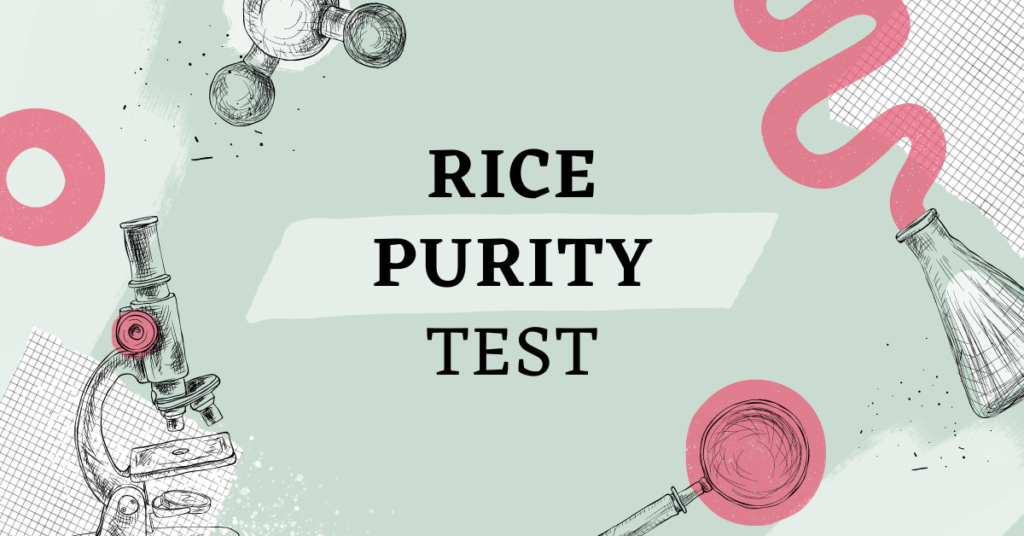Table of Contents
The Rice Purity Test is a self-graded survey designed to measure the “purity” of a person based on their life experiences. This comprehensive exploration delves into the origins of the Rice Purity Test, its evolution over the years, the controversies it has sparked, and its cultural impact.
Origins of the Rice Purity Test
The Rice Purity Test originated at Rice University in Houston, Texas, in the early 1980s. It was initially created by university students as a bonding activity and a way to facilitate discussions about personal experiences. The original test, administered on paper, consisted of 100 questions covering a wide range of activities, from benign actions like holding hands to more taboo behaviors such as drug use and sexual activities. The purpose was to gauge individual purity and help students open up about their lives, fostering a sense of community and understanding.
Evolution of the Test
Over the years, the Rice Purity Test has evolved significantly. With the advent of the internet, it transitioned from a paper format to an online version, making it accessible to a global audience. This online format also allowed for updates, incorporating contemporary issues and experiences that were not originally covered. The structure has remained consistent, with 100 questions that participants answer with “yes” or “no,” and higher scores indicating greater “purity.” The ease of sharing and taking the test online has contributed to its popularity, especially among teenagers and young adults who use it as a social activity or icebreaker.
The Content of the Rice Purity Test
The questions in the Rice Purity Test cover various activities:
Innocent Activities: Actions like holding hands, kissing, or going on a date are considered mild and are often answered “yes” by most participants.
Substance Use: This category asks about the use of alcohol, tobacco, and various illegal drugs, gauging the participant’s experiences with substance use and abuse.
Sexual Activities: This section covers a spectrum of sexual behaviors, from kissing to more explicit activities, often leading to discussions about sexual health and safety.
Criminal Behavior: Questions about activities that are illegal, such as vandalism, theft, and other forms of criminal conduct, help understand the participant’s engagement in unlawful behavior.
Miscellaneous Experiences: This catch-all category includes questions about other experiences, such as running away from home, being arrested, or getting a tattoo.
The variety and depth of the questions provide a broad overview of the participant’s life experiences, making the Rice Purity Test a comprehensive tool for self-reflection and discussion.
Controversies and Criticisms
Despite its popularity, the Rice Purity Test has not been without controversy.
Privacy Concerns: Taking the test involves revealing potentially sensitive information about one’s life experiences, which can lead to discomfort or embarrassment in group settings.
Normalization of Risky Behaviors: By including questions about illegal or risky behaviors, some argue that the test could normalize these activities, especially among impressionable young people.
Stigmatization: Low scores can lead to stigma and judgment from peers, perpetuating a culture of shame around certain behaviors or experiences.
Lack of Context: The test does not account for the context in which certain behaviors occurred, such as those influenced by trauma or peer pressure, potentially leading to unfair judgments.
Cultural Impact
The Rice Purity Test has had a significant cultural impact, particularly among young adults and college students.
Icebreaker: The test is often used as an icebreaker in new social environments, helping individuals to bond over shared experiences and differences.
Self-Reflection: By taking the test, individuals can reflect on their own life experiences and consider how they compare to others, leading to greater self-awareness and personal growth.
Discussion Starter: The test’s questions can serve as a starting point for discussions about important topics, such as sexual health, substance use, and personal boundaries.
Community Building: By sharing their scores and experiences, individuals can build a sense of community and mutual understanding, fostering closer relationships.
The Test in Modern Context
In today’s context, the Rice Purity Test has maintained its relevance through continuous adaptation and inherent simplicity. Its presence on social media platforms and online forums has amplified its reach, making it a global phenomenon. Memes and discussions about the test frequently appear on platforms like Twitter, Reddit, and TikTok, where users share their scores and reactions. Additionally, the test has inspired numerous spin-offs and variations, each tailored to different subcultures and interests.
Future of the Rice Purity Test
As societal norms and values continue to evolve, the Rice Purity Test is likely to undergo further changes. Future iterations may include questions reflecting contemporary issues, such as digital privacy, social media behavior, and mental health. The test’s adaptability will ensure its continued relevance as a tool for self-assessment and social interaction. Additionally, ethical considerations surrounding the test will likely become more pronounced. As awareness of mental health and the impact of peer pressure grows, creators and users of the test may place greater emphasis on ensuring it is used responsibly and respectfully.
Conclusion
The Rice Purity Test is a fascinating example of how a simple survey can capture the imaginations of young people and become a cultural touchstone. Its origins at Rice University, evolution into an online phenomenon, and impact on social dynamics highlight both its enduring appeal and the controversies it can spark. While the test provides a fun and engaging way to explore personal experiences, it also serves as a reminder of the importance of context, privacy, and respect in our interactions with others. As it continues to adapt to changing times, the Rice Purity Test will remain a unique and intriguing part of the social landscape.
For More Information Please Visit These Websites Viprow And Glowmagzine

